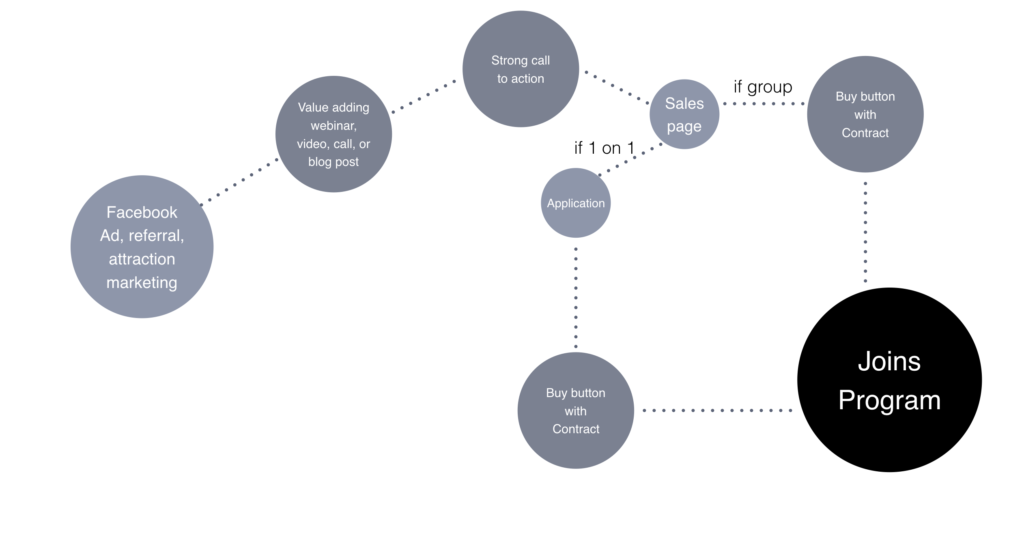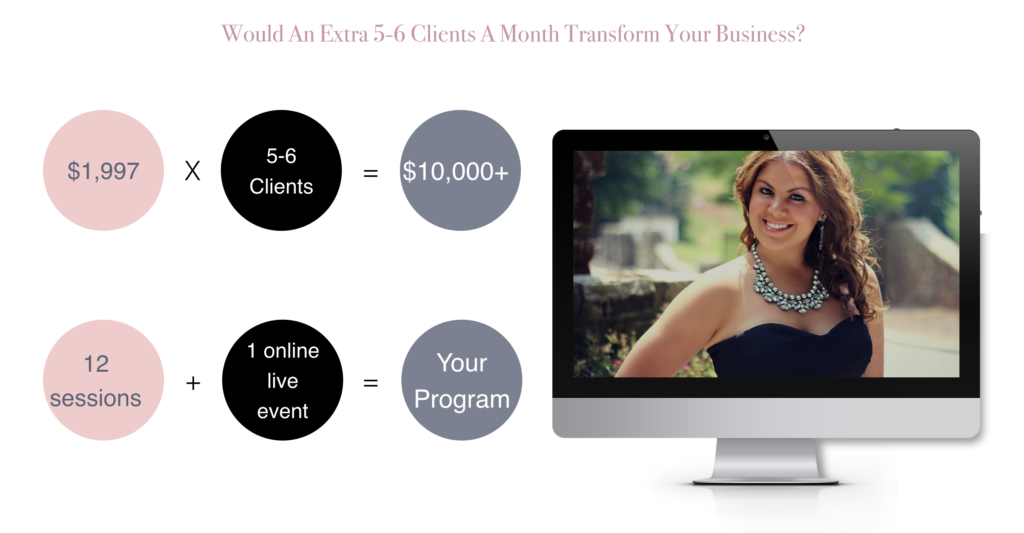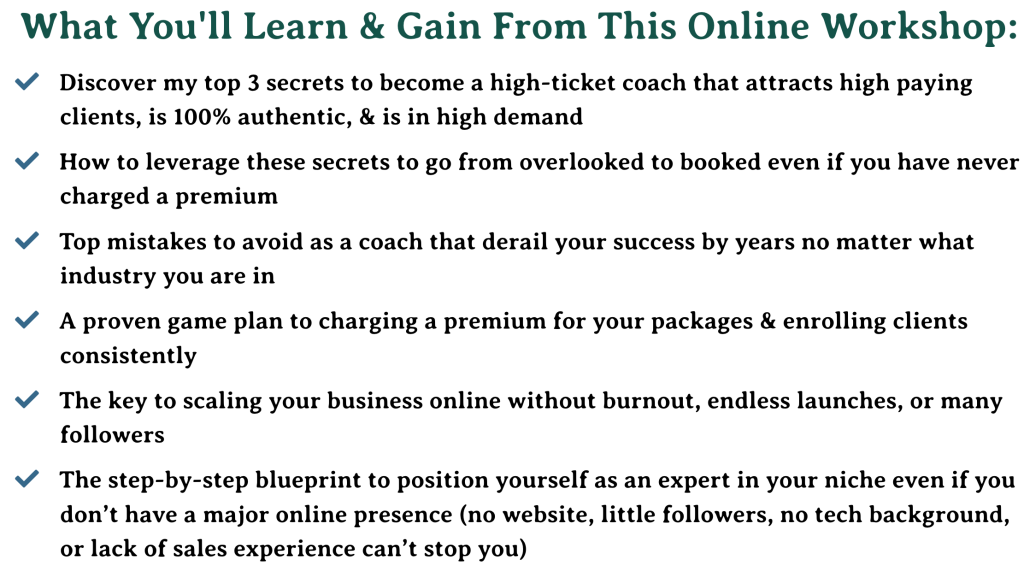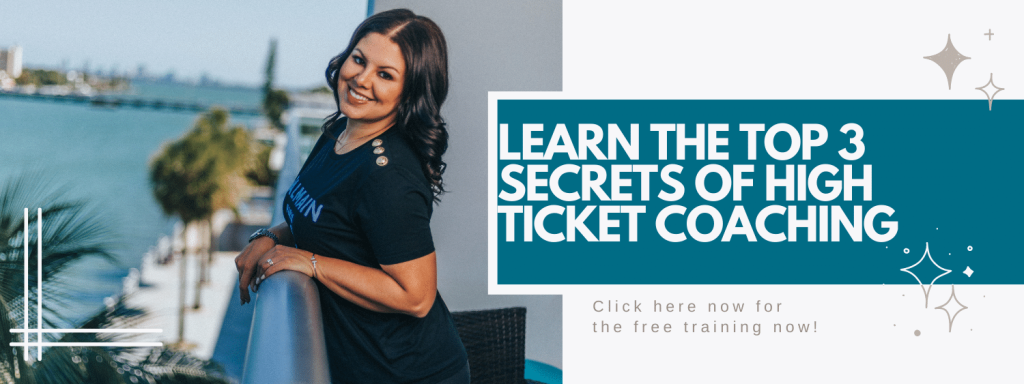
This post is all about one on one coaching program.
One On One Coaching Program
One-on-one coaching is a personalized and focused approach to support individuals in reaching their goals and realizing their potential.
To make the most of this program, it’s important to design it in a way that will help your clients achieve the desired outcomes.
Use this as a guide and not as a limitation as you are still the expert to help your clients get results. For instance, with my coaching clients in 20+ countries, I focus on how I can help them and not on what other coaches are doing. These tips are here to guide you design your one on one coaching program and you can customize these tips based on what you know will help your ideal client.
Here’s a more in-depth look at the key steps to designing a one-on-one coaching program for maximum impact:
- Clearly Define Goals: Before you start designing your coaching program, it’s important to have a clear understanding of what you hope to achieve. This could be anything from helping clients overcome a specific challenge, to developing new skills or improving performance. Having a clear understanding of your goals will help you create a program that is aligned with your desired outcomes and ensures that your clients stay on track. Click here for tips on your coaching business plan.
- Identify Your Target Audience: Knowing who your target audience is and what their needs are will help you create a program that resonates with them. Consider factors such as their age, background, and specific challenges, and tailor your program to meet their unique needs.
- Choose the Right Coach: The coach you choose will play a critical role in the success of your coaching program. Look for someone who has the expertise and experience necessary to help your clients achieve their goals, as well as a coaching style that will inspire and motivate them. It’s also important to choose a coach who is a good fit for your target audience, as this will help build trust and establish a strong rapport.
- Create a Customized Coaching Plan: Each individual’s goals and needs will be unique, so it’s important to create a coaching plan that is tailored to their specific requirements. This could include regular check-ins, specific milestones, and tailored feedback and support. By creating a customized plan, you can help your clients stay focused and motivated throughout their coaching journey.
- Use a Variety of Coaching Tools: To maximize impact, it’s important to use a range of coaching tools and techniques. This could include assessments, goal-setting exercises, and personalized feedback, all of which will help you build a relationship with your clients and provide them with the support they need to succeed. Click here to learn more about coaching business tools.
- Foster a Supportive Environment: Encouraging your clients to share their experiences and connect with others in the program will help create a supportive and motivating environment. This can be achieved through regular check-ins, group sessions, and opportunities for clients to share their progress and challenges.
- Measure Success: Regularly evaluating the effectiveness of your coaching program will help you refine your approach and ensure that it continues to deliver results. This could involve tracking progress towards specific goals, as well as evaluating feedback from clients and coaches. By measuring success, you can continuously improve your program and ensure that it delivers the results your clients need. Click here for more tips on marketing your coaching business.
Designing a one-on-one coaching program for maximum impact requires careful consideration of your goals, target audience, and the right coach.
By incorporating a customized coaching plan, a range of coaching tools, a supportive environment, and regular evaluation, you can help your clients achieve their full potential and reach their desired outcomes.
Learn more in the free online deep-dive training now- it’s free:
How to To Promote Your One On One Coaching Program
Webinars: Hosting webinars is an effective way to educate potential clients about your coaching program and demonstrate your expertise.
To promote your webinars, you can use email marketing to send invitations to your mailing list, post about it on social media platforms, and reach out to your personal network to invite friends and colleagues.
During the webinar, provide valuable insights and information related to your coaching program, and encourage attendees to ask questions. After the webinar, follow up with attendees to answer any remaining questions and provide additional information about your program.
Social Media: Social media platforms are powerful tools for promoting your coaching program. Choose platforms that your target audience is most active on and create high-quality, engaging content that showcases your coaching program and the benefits it provides.
Share testimonials from satisfied clients and interact with your followers by responding to questions and comments. You can also use paid advertising options to reach a wider audience and drive more traffic to your coaching program.
Affiliates: Partnering with affiliates, such as bloggers and influencers, can help you reach a wider audience and promote your coaching program.
Offer affiliates a commission or incentive for each client they refer to your program. Ensure that your affiliates have all the information and resources they need to effectively promote your coaching program and answer any questions potential clients may have.
Personal Network: Your personal network of friends, family, and business contacts can be a valuable source of referrals for your coaching program.
Leverage your network by hosting in-person events or meet-ups, providing personal referrals to individuals who could benefit from your coaching services, and reaching out to your contacts through email and social media.
Email Marketing: Building an email list of potential clients is an important step in promoting your coaching program. Regular newsletters and promotional emails can be used to highlight the benefits of your coaching program and offer special deals or incentives.
Personalize your emails to build a strong relationship with your subscribers and make sure they feel valued. You can also segment your email list based on subscriber interests to create targeted campaigns that are more effective.
How to get high ticket clients for your one on one coaching program
Niche Specialization: To attract high-ticket clients, you need to establish yourself as an expert in a specific niche. This could be a particular industry, a particular type of client, or a specific issue that your coaching program addresses.
By focusing on a niche, you can offer specialized services that cater to the unique needs and challenges of your target market. This will help you differentiate yourself from other coaches and position yourself as the go-to expert in your niche.
Networking: Networking is an important aspect of attracting high-ticket clients. By attending events, conferences, and meet-ups related to your niche, you can build relationships with industry leaders and potential clients.
You can also partner with complementary businesses and referral sources to expand your reach and promote your coaching program. Networking allows you to build relationships, demonstrate your expertise, and provide valuable insights and information to potential clients.
Online Presence: Establishing a strong online presence is crucial in attracting high-ticket clients. This includes having a professional website, active social media accounts, and an online presence in directories and listings related to your niche.
Your online presence should showcase your expertise and highlight the results your coaching program delivers. By creating high-quality content, such as blog posts, videos, and ebooks, you can demonstrate your knowledge and build trust with potential clients.
Lead Magnets: Lead magnets are a powerful tool for attracting high-ticket clients. These are free resources, such as ebooks, webinars, or email courses, that provide valuable information related to your coaching program.

Lead magnets help you build your email list and provide potential clients with a taste of your expertise. They also give you the opportunity to showcase the results your coaching program delivers and encourage potential clients to take the next step and become a paying client.
High-Value Offers: Offering high-value packages, such as VIP days or premium coaching programs, can help you attract high-ticket clients.
These programs should demonstrate the unique value and results your coaching program provides, and how it can help clients achieve their goals. High-value packages should be priced accordingly, offering exclusive benefits and a high level of support and guidance to clients.

Testimonials: Testimonials from satisfied clients are a powerful tool for attracting high-ticket clients. These case studies and testimonials demonstrate the results your coaching program delivers and help build credibility and trust with potential clients.
Be sure to collect testimonials from clients who have achieved significant results and are willing to share their experience with others.
Sales Funnel: A sales funnel is a step-by-step process that guides potential clients from initial interest to becoming a high-ticket client. This process includes lead generation, nurturing, and conversion.
By using email marketing, webinars, and other marketing strategies, you can move potential clients through your sales funnel and convert them into paying clients.
Your sales funnel should be tailored to your target audience and highlight the benefits and results of your coaching program.
Referral Program: Implementing a referral program is a great way to attract high-ticket clients.
Encourage satisfied clients to refer new clients to your coaching program and offer incentives and rewards for successful referrals.
A referral program helps you expand your reach and tap into the networks of your satisfied clients. By offering a referral program, you can increase the visibility of your coaching program and attract new high-ticket clients.
Why you should consider one on one coaching as a new coach over starting with a group coaching program:
Personalization: One-on-one coaching offers a highly personalized experience for clients. This allows coaches to tailor their approach and services to meet the unique needs and goals of each client. Clients receive undivided attention and customized support, which can lead to faster and more significant results.
Flexibility: With one-on-one coaching, the coach has the flexibility to adapt the coaching program to the client’s pace and schedule. This allows for a more fluid and flexible coaching experience, which can be particularly beneficial for clients with demanding schedules or specific needs.
Higher Engagement: One-on-one coaching often leads to higher levels of engagement and accountability for clients. Clients are more likely to stay committed to their goals and make progress when they receive dedicated support from a coach. With one-on-one coaching, clients can receive focused feedback and guidance, which can increase their motivation and drive towards success.
Increased Revenue Potential: One-on-one coaching often commands higher fees than group coaching programs. This is because clients are paying for a highly personalized experience and a higher level of support and guidance. For coaches, this can lead to increased revenue potential and a more sustainable business model.
Greater Privacy: Some clients may prefer one-on-one coaching for privacy reasons. They may not want to share their personal issues or goals in a group setting and would prefer a more confidential coaching experience. One-on-one coaching provides a safe and secure environment for clients to work through their challenges and achieve their goals.
Improved Client Retention: Clients are more likely to continue their coaching journey and stay committed to their goals when they receive personalized support and attention from a coach. With one-on-one coaching, clients can receive tailored feedback and guidance, which can increase their motivation and drive towards success. This can lead to improved client retention and a more sustainable business model for coaches.
Remember…
You can have it all and you can have it now!
This post was all about one on one coaching program.










